In June 2025, Daybreak Game Company did the unthinkable. Rather than celebrate or support a fan-made EverQuest emulator built with care and passion, they sued its creators in federal court. The target? The Heroes’ Journey (THJ), a community-driven EverQuest emulator server that dared to do what Daybreak hasn’t done in years: innovate, inspire, and grow the EverQuest legacy.
I have read the full 41-page complaint filed by Daybreak Games. What I found was not a reasoned defense of creative ownership, but a paranoid, corporate overreach drenched in self-pity and hypocrisy. This lawsuit isn’t about protecting intellectual property. It’s about silencing creativity, controlling nostalgia, and squeezing every last cent from a franchise Daybreak has otherwise left to rot.
A Legacy of Mismanagement
Daybreak Games, a subsidiary of Swedish media holding company Enad Global 7 (EG7), has been running EverQuest like a cash cow on life support. Their business model for the past decade has relied almost exclusively on recycling content through seasonal Time-Locked Progression (TLP) servers, each barely distinguishable from the last. Innovation is rare. Community input is ignored. Contempt for their players is real. And meaningful development has slowed to a crawl.
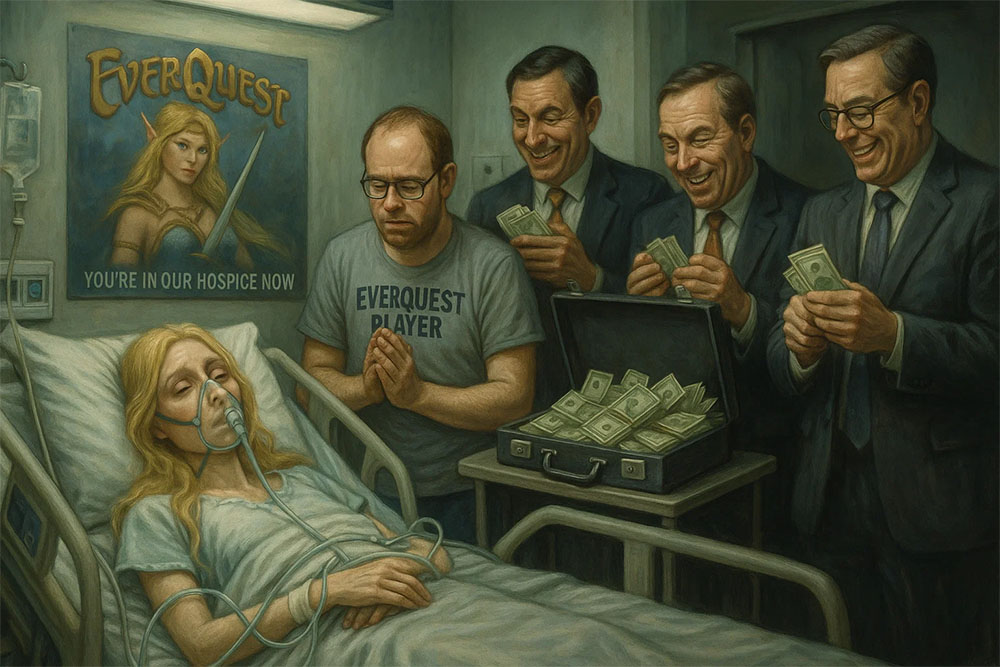
When passionate players asked for quality-of-life updates or fresh gameplay ideas, Daybreak offered more Pride month vanity pets. When those same players started exploring emulators like Project 1999 and THJ, Daybreak scoffed. In public forums and private Discords, Daybreak employees made clear: those players aren’t our audience.
Now, in a stunning reversal, Daybreak is suing that same audience—because they finally built something better.
The Heroes’ Journey: What Daybreak Never Dared to Attempt
THJ didn’t just preserve the EverQuest experience. It reinvented it. With features like multiclassing, solo-friendly tuning, and streamlined onboarding, THJ turned EverQuest from a punishing grindfest into a compelling, modern experience without sacrificing its old-school charm.
Players flocked to the server. YouTube tutorials gained traction. A dedicated Discord exploded to over 20,000 members. And in forums like Fires of Heaven, THJ was praised as the most exciting thing to happen to EQ in years.
THJ’s developers, working under aliases like “Aporia” and “Catapultam-Habeo,” even acknowledged their respect for the source material. They asked nothing in return from players—except optional donations. And therein lies the rub.
Daybreak’s Real Objection: Competition
While Daybreak tolerated Project 1999 for years—likely because it didn’t monetize or modernize—THJ dared to build something better and offered optional perks through its donation system. Players could obtain in-game cosmetics using “Echoes of Memory,” a premium currency given to supporters.
Daybreak pounced.
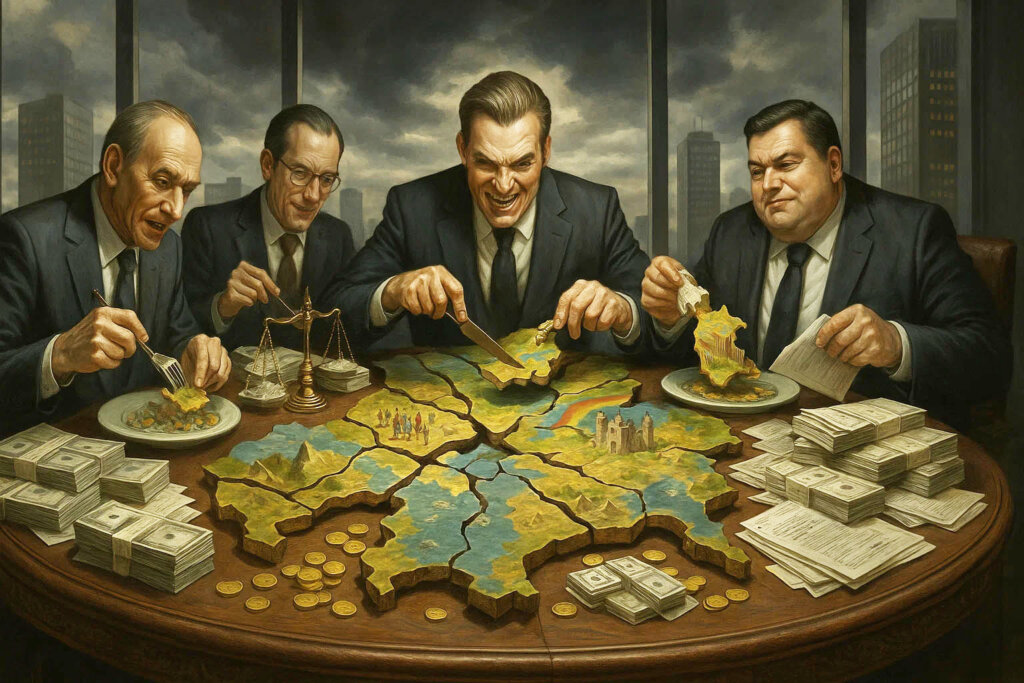
In their complaint, Daybreak accuses THJ of systematic and ongoing infringement that causes substantial irreparable harm to its business. They claim THJ dilutes Daybreak’s famous EVERQUEST mark and that the emulator project constitutes a thinly-disguised ‘donation’ system to profit off their intellectual property.
They go so far as to allege that THJ’s very act of allowing players to use the Steam version of EverQuest constitutes a violation, writing:
“THJ’s official installation guide… instructs them to download Daybreak’s copyrighted client files as the foundation for running THJ.“
Let that sink in: Daybreak is suing fans for downloading their own game.
The complaint also offers a breathtaking example of corporate hubris:
“This ongoing harm to the EverQuest franchise cannot be remedied solely by monetary damages.“
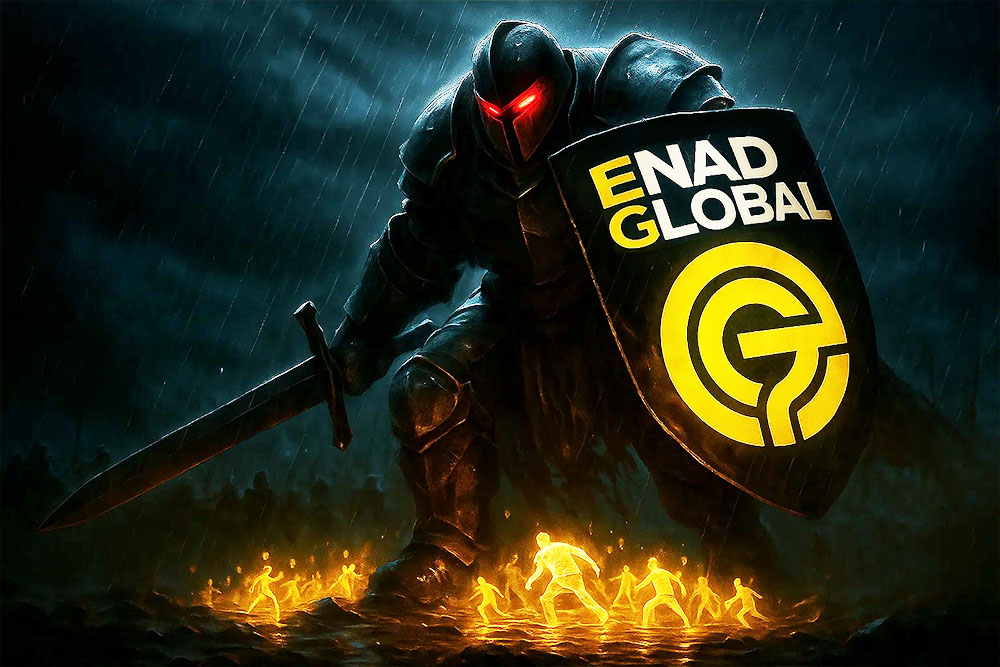
Translation? They don’t just want money. They want control. Total, annihilating control.
Legal Overkill, Corporate Cowardice
Backed by international megafirm Dentons, Daybreak isn’t just asking the court to stop THJ. They’re demanding total obliteration:
- Destruction of all source code, server files, and documentation.
- Shutdown of THJ’s website, wiki, GitHub, and Discord.
- Public identification and doxxing of all THJ contributors.
- A written sworn statement under penalty of perjury detailing how the devs dismantled everything.
It’s not a cease and desist. It’s a vendetta.
They write:
“Plaintiff seeks emergency injunctive relief to immediately halt Defendants’ infringing activities… because monetary damages alone cannot remedy the ongoing erosion of Daybreak’s market position.“
But the truth is, Daybreak hasn’t had a market position worth defending in years.
Meet Dentons: Global Power, Local Bully
Dentons is no ordinary law firm. They are the world’s largest by headcount, formed through a series of aggressive international mergers. With offices in more than 80 countries, Dentons represents a kind of legal globalization machine—a firm that proudly advertises its ability to deliver seamlessly across jurisdictions.
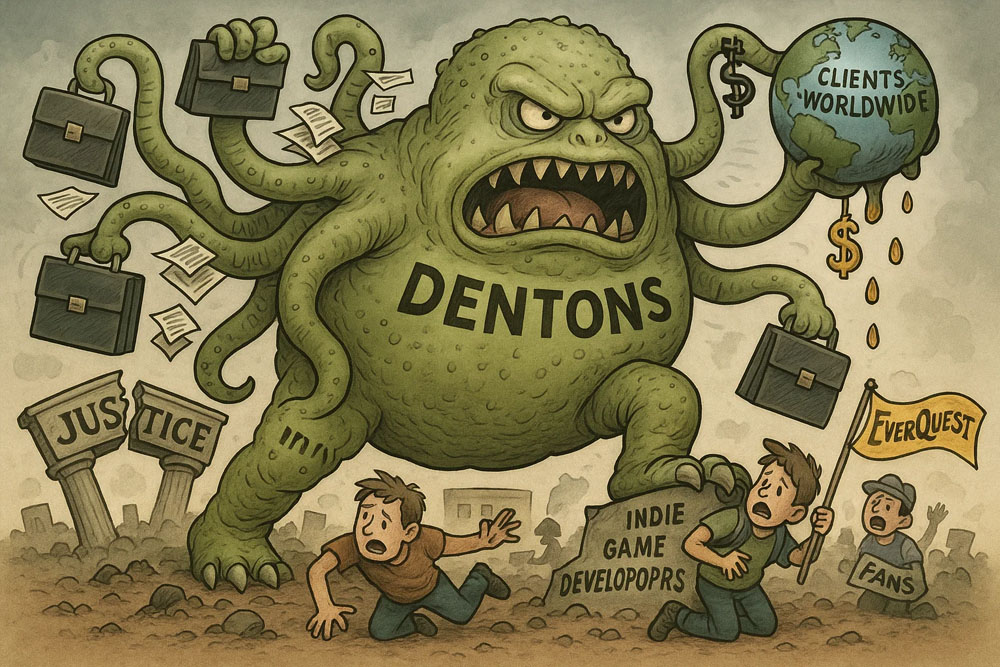
But their reputation isn’t just about size. Dentons is known for representing large corporate clients in disputes against smaller entities. Their playbook relies on overwhelming force, jurisdictional complexity, and intimidation through paperwork volume. They are not builders of consensus. They are executors of legal warfare.
In Daybreak’s case, Dentons assembled a bi-coastal team with Los Angeles and New York offices involved, including Monica B. Richman and Daniel A. Schnapp—both known for aggressive IP litigation. This wasn’t a minor filing. It was a full-scale assault, with demands that go beyond mere takedown and into total community erasure.
Daybreak didn’t just hire lawyers. They hired war dogs.
They Tried to Hide It: Why Daybreak Wanted a TRO Behind Closed Doors
There’s a reason most people didn’t hear about this lawsuit until it was exposed by a few outlets like MassivelyOP: Daybreak wanted it that way.
They attempted to get a Temporary Restraining Order (TRO) in secret — without notice to the defendants. They also tried to seal the entire complaint so it wouldn’t be publicly accessible.
The judge denied both requests.
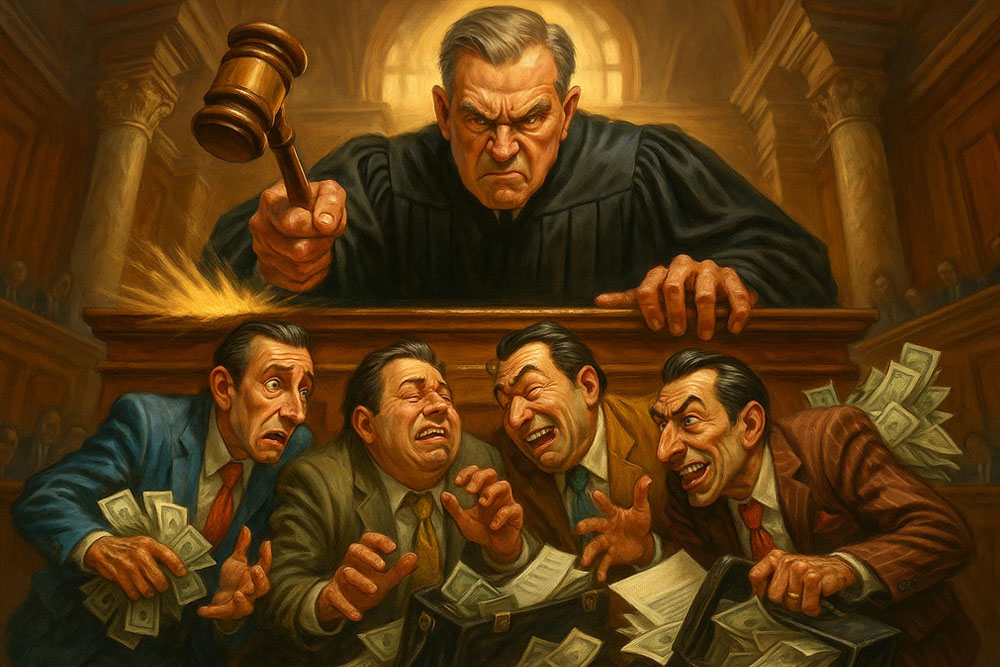
That tells you everything. This wasn’t meant to be debated or even seen. It was meant to be a quiet legal assassination: strike hard, delete everything, and leave no room for backlash.
They didn’t expect the community to notice. They certainly didn’t expect us to fight back.
The only thing that ruined their plan was daylight.
A Tale of Two Emulators: Why P99 Thrives While THJ Gets Sued
Project 1999 (P99), the most prominent EverQuest emulator, has been operating openly for over a decade. Daybreak never sued it. Never threatened it. Never lifted a legal finger against it.
So why now? Why THJ?
Because P99 played it safe. It didn’t modernize. It didn’t innovate. Most importantly, it didn’t monetize. THJ did all three.
“THJ enhanced and expanded upon EQEmu’s functionality to create an unauthorized derivative EverQuest experience.” (Complaint, §46)
That enhancement—that creativity—is the real threat.
This inconsistency opens Daybreak up to accusations of selective enforcement. In legal terms: if emulators were truly harmful to the brand, why allow P99 to thrive? Why tolerate other servers? Why wait years before taking any action?
You can’t sleep on fan servers for a decade and then wake up mad when one surpasses you.
The Community Reacts: Shock, Anger, Resolve
EverQuest fans have been through a lot: buggy expansions, broken promises, and years of indifference. But this lawsuit feels like betrayal on a new level. Reddit threads exploded. Forum posts lit up with anger. Even staunch supporters of Daybreak expressed dismay at the company’s scorched-earth approach.
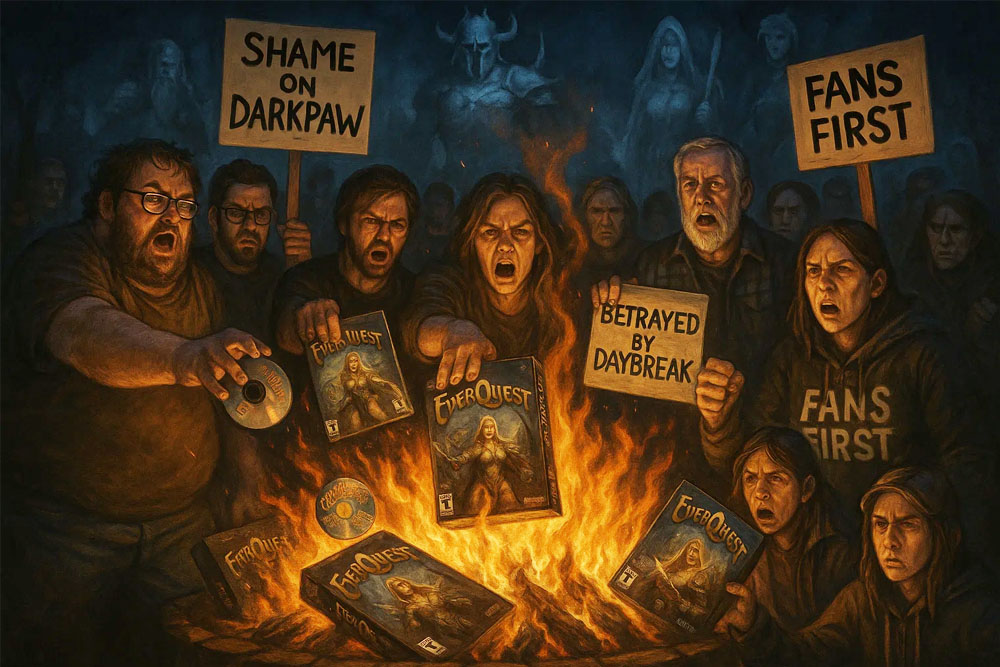
One Redditor put it best:
“They didn’t defend a legacy. They sued a mirror.“
Worse, the lawsuit may only accelerate the community’s decline. THJ was attracting lapsed players—many of whom might never return to Daybreak’s tightly controlled, monetization-heavy servers.
What Daybreak Fears Most: That Fans Can Do It Better
The lawsuit against THJ isn’t just about IP. It’s about ego. It’s about a legacy studio terrified that its most loyal fans have outdone them in every category: gameplay, community, and heart.
If Daybreak had any foresight, they would have reached out to THJ, offered support, maybe even proposed an official partnership. Instead, they sent lawyers.
That decision will haunt them.
Darkpaw’s Skeleton Crew: Contempt Disguised as Stewardship
Why does Daybreak react with such hostility toward innovation from its own fans? The answer lies with its internal division, Darkpaw Games, which has treated EverQuest not as a living, evolving world but as a tired cash cow to be milked dry. Rather than investing in a robust, visionary team to honor this legendary franchise, Darkpaw allocated what can only be described as an inept skeleton crew — a few washed-up corpulent developers well past their creative prime.
These developers have shown open contempt for the very players who kept EverQuest alive. Community concerns are routinely ignored, meaningful feedback is dismissed, and any calls for genuine improvements are met with shallow PR spin and an endless stream of cash shop offerings.
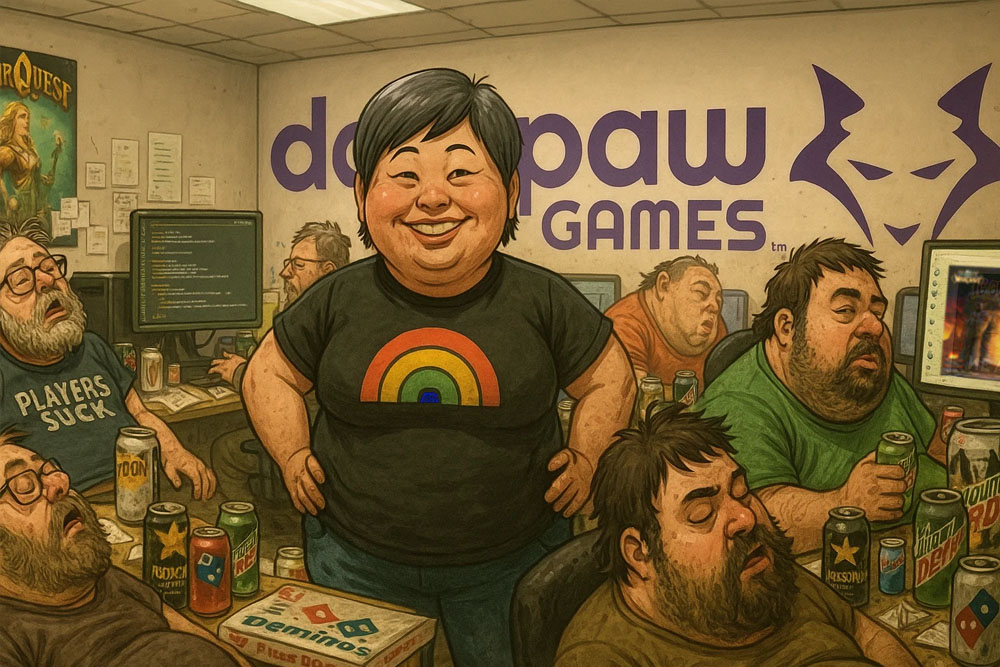
The shameful cancellation of EverQuest Next remains the ultimate proof of this managerial rot. Once heralded as the bold future of the franchise, EverQuest Next was dangled before the community as a promise of innovation — only to be unceremoniously killed off, leaving behind nothing but broken trust and shattered hopes.
Against this backdrop, Daybreak’s aggressive legal assault on The Heroes’ Journey isn’t just a corporate misstep — it’s a declaration of war against the very players who kept Norrath’s spirit alive when Darkpaw wouldn’t.
And it casts a long, ominous shadow over any rumored “new EverQuest” project. If Daybreak cannot tolerate a volunteer team revitalizing their old worlds, what chance is there that a new official version will be anything but another exercise in control, monetization, and empty marketing? The future looks bleak — driven by fear rather than vision, by greed rather than passion.
A Call to Remember Who Built Norrath
EverQuest didn’t become legendary because of its corporate owners. It became legendary because of its players. Because of the guilds who wiped to Cazic-Thule for hours. Because of the friends made in Lower Guk. Because of the community that carried it forward when Daybreak all but gave up.
The Heroes’ Journey may fall. But the message is clear:
Daybreak doesn’t own the soul of EverQuest. The players do.
And they always will.
—Wolfshead
Read the Full Lawsuit Yourself
I believe in transparency — something Daybreak clearly does not.
Here is the full official 41-page federal complaint (Case No. 3:25-cv-01489-BAS-BLM) that Daybreak filed against The Heroes’ Journey. I obtained this document directly from PACER at my own expense so the community can see exactly what was said, without spin or corporate PR filters.

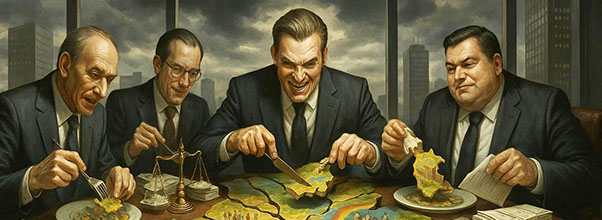
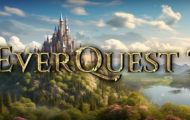
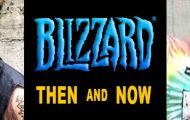

Was this action actually so unexpected?
You highlighted the key differences between P99 and THJ.
Monetization, Innovation/Alteration and what both did, using the EQ background, lore, client as basis.
Daybreak are going to win this easily.
P99 could also be sued. They would have no chance to survive a lawsuit either.
They don’t see P99 as competition worth the effort. The very moment THJ collected a penny and attracted people was when it became competition using their client and IP.
Sure, there might be quite some anger and envy when seeing what can do behind this as well. This doesn’t hold up in court or improve the legal situation of THJ in any way, though.
They knew this wouldn’t sit well with the fanbase, but can they really allow competition of this kind? Answer this yourself honestly, no, they can’t tolerate this.
They paid for the EQ IP to make money with it. That they abuse and neglect it is terrible, but besides buying back the IP the only thing that can be done is to make a spiritual successor to EQ that Enad/Daybreak do not own.
No matter what happens, this is a bad look for Enad Global 7, Daybreak, and Darkpaw. The fact that EQ fans created a server far better than the repetitive content they’ve been serving up for years speaks volumes about the creative rot and apathy at Darkpaw. That’s the takeaway here which I believe I made quite clear in the article.
The fact that 12k people played on this server which was made by EQ fans also is a vindication that players care and know more about the EQ franchise than the current dev team. The prevailing wisdom on the official forums is that the devs know best. Players vote with their feet.
Daybreak could have sat down with the people at THJ just like Blizzard CEO Mike Morpheme met with the Nostalrius dev team. But they didn’t. Why? Because they are arrogant assholes who don’t give a fuck about EverQuest. Look at the Daybreak C-Suite. Not one person there has a clue about video games and any street cred. They are all corporate stiffs getting fat off the backs of loyal players. Read the reviews on Glassdoor about Daybreak. I’ve posted about this years ago. It’s a complete shitshow. It’s a fucking disgrace.
I have ZERO patience for sycophants. They have enabled this.
You will notice that there are many sycophants at the MOP and FOH forums that are cheering Daybreak on. These idiots don’t see the big picture. Bree Royce is doing this because she has her snout in the access journalism trough.
I no longer play EQ, and I never will again. So I’ve got no dog in this hunt.
Those 12,000 daily THJ players will not come back to Darkpaw after they pulled the plug with this stunt. I also believe that Project 1999 makes money on the side, too. There have been many rumors over the years that attest to this.
While Daybreak may prevail, they will lose far more in the long run. Just because you have the legal right to do something doesn’t mean you should.
I am feeling the pain of EverQuest fans. It is a terrible situation. But while they might own the soul, the still twitching carcass, to speak figuratively, unfortunately does not.
It is a tragedy. IMO the only hope is a spiritual successor or buying it back when EQ is so ruined that it is sold for neglible amounts of money.
Sorry for being blunt, I feel for you and the MMO genre, but what else could be done? Daybreak sitting together with the fanbase?
Is the still playing fanbase capable of influencing Daybreak by not playing and paying? A massive effort would be needed to do so, and even then, let me be frank, I see Enad/Daybreak still both unable and unwilling to put effort and more than a penny into Everquest.
The biggest problem right now is the diehard EQ players who continue to support Darkpaw no matter what. They are addicts who can’t seem to kick their habit.
If every EQ player stopped playing and paying for one month they would bring Darkpaw to their knees. All of those talentless hack “devs” would be out on the street where they fucking belong. No more pride pets. Gone.
Daybreak and Darkpaw need to crash and burn because providential justice demands it. Then, a reputable studio can purchase the IP. That’s the only way the EQ franchise can be saved.
This kind of dev-loving forum community is something you often warned about. Daybreak was always your showcase example for this.
I experienced similar things with Guild Wars. From enthusiast player to major fan forum moderator to intern and in some cases community manager. Or think of Moorgard/Danuser’s career. Not quite Anakin gone Darth Vader but also a person with huge potential turning out quite awful.
Short sighted community management, but well, Daybreak is known for that, plus Enad on top of Daybreak. That’s truly hopeless.
I hope that a new company will emerge, a new Blizzard. There are young people who never experienced the 8 bit era but love it incredibly much.
A similar rediscovery of the roots of MMO gaming and having success, I do not want to sugarcoat it, the changes nowadays are slim. Other genres are popular, the audience also craves other things.
Maybe Blizzard has to totally ruin WoW and lose hard for the MMO genre to have a chance of renewal.
The things is, WoW still is good enough to suck up people interested in MMO gaming.
It is a pity, currently people are experiencing a polished turd and next to nothing of the early mmo gaming era fascination. But you know all that already.
Currently I see SJWs making attacks on and wokeness sneaking into the Warhammer 40k universe. Maybe everything has to turn into literal poo before wokeness finally stops twitching. So far it proves to be a hydra.
EqEmus are allowed to exist because they do not directly monetize their projects and/or are so niche the value of their monetization is not worth the headache such as The Hidden Forest which has monetized their server for over 10 years and is likely protected in-part due to the developer being in Asia but again remains small and unthreatening. Their monetization is also layered and unadvertised.
On the contrary THJ is none of that and also actively advertised in-game services in return for payment. The real nail in the coffin is their in-game services included an experience bonus which I would wager is DBG’s highest grossing microtransaction service offered. This displays a market strategy approach to maximize profits.
That said, they have now placed EQEmu as a whole at risk for their own selfish and greedy interests. I have zero sympathy for them.
“B-but they created a better product and DBG is barely keeping Everquest on life support with their incompetence!”
Well, they should have done it responsibly by creating their product, proving the concept as a success and then approaching DBG, they likely would have received plenty of unsolicited support still as it really is a great concept and from what i’ve seen well executed. Instead they spit in the face of the entire community. DBG also requested they were shutdown and instead of taking their server down in goodwill they keep it up, absolute disregard.
They thought they can get away with it and then became victims of success.
Thinking about other servers/emulators for various games and their not openly advertised ways of monetization, the legal grey zone becomes quite dark with girl in most cases.
And yeah, that they often improve and so things better is not really an argument in this regard.
Thanks for showing that the problem was quite a lot of their own making.